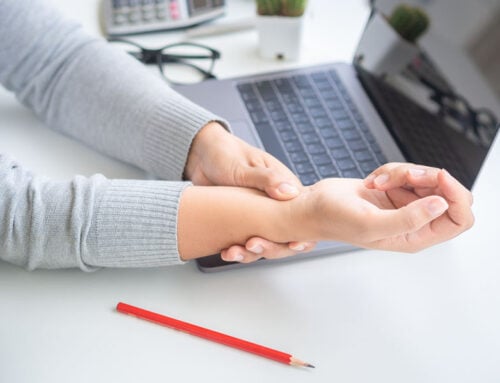Does Something Feel Out Of Place?
Lumbar or lower back pain can happen after a long day of work or on the sports field. But when that pain is chronic, there’s something else at play. Sometimes, intervertebral discs can shift out of place, a herniated disc. Herniated discs happen to millions of people and can be distressing. The initial thought of back pain sufferers may be surgery via lumbar discectomy and laminectomy. But can these discs heal naturally?

Here's what's going on with your disc
The spine is a complex part of the body. Strong bones, called vertebrae, protect the spinal cord and are connected by facet joints. Between each vertebra are rigid, fibrous discs. These discs are weight-bearing and help with shock absorption. Sometimes, the disc's outer layer can shift out of place due to wear and tear or injury. In other cases, the inner nucleus can pass through a space in the disc wall. Herniated discs can press on surrounding nerves causing inflammation, nerve pain, and muscle weakness. Some cases create a painful symptom called sciatica, or nerve pain in the leg. Over time, the pain can impact the quality of life.
Non-surgical treatment can help
Herniated discs are quite common. Surprisingly, many people with herniated discs are asymptomatic. However, for those with chronic pain, treatment is necessary to improve the quality of life. Several non-surgical techniques can help. A doctor or orthopedic surgeon can recommend pain medication, physical therapy, steroid injections and other alternative treatment.
Can these discs heal naturally?
Applying these conservative treatments can encourage the body to repair the disc. For instance, the immune system can detect a problem and attack the disc fragments, relieving pain. Sometimes, the liquid of the nucleus can resolve. In addition, physical therapy and exercise can strengthen the surrounding muscles and bones, helping the disc move back into place.
Is it healed? Or something else?
Conservative techniques give the impression that the disc healed naturally. However, if the disc is ruptured or has shifted, there's no way to undo the damage. What's happening is that the treatment allows the disc to be asymptomatic. Many patients go on to live a pain-free life, even with the damaged disc. For some people, the pain persists, even with treatment. So the real issue is if the disc causes pain that affects the quality of life. At this point, surgery is a helpful tool for resolving lumbar herniated discs long-term.
A lumbar discectomy may help
An orthopedic surgeon may suggest removing parts of the disc to relieve pain and weakness. Spinal surgeries were once considered major open surgeries. Today, many surgeons use minimally invasive means to repair herniated discs. Using a series of small incisions at the lower back, the surgeon can access the disc and remove the disc material. Today, surgeons also use endoscopic spinal surgery for faster, safer procedures, with a high success rate.
Laminectomy can accompany your discectomy
In some cases, the orthopedic surgeon will also perform a laminectomy. The lamina, a small piece that covers the spine, can also press on surrounding nerves. During the discectomy, the surgeon removes the lamina with surgical tools. In some cases, the bones are fused with a bone graft and metal plates. If lumbar discectomy and laminectomy happen in an outpatient setting, the patient can leave the same day. The surgeon will outline the entire procedure, using the steps that provide the best outcome.
Conservative or surgery. Which is best?
In most cases, non-surgical treatment can relieve pain and discomfort. These treatments can give the impression that the disc has healed. However, treatment can only manage pain or make the issue asymptomatic. In most cases, if treatment stops, the pain can return. Remember, the damaged disc is there but is no longer a threat. Unfortunately, some patients would not respond to treatment and still have chronic pain. When this happens, lumbar discectomy and laminectomy can help. Is back pain constantly affecting the quality of life? Then speak to an orthopedic surgeon before the situation worsens.



